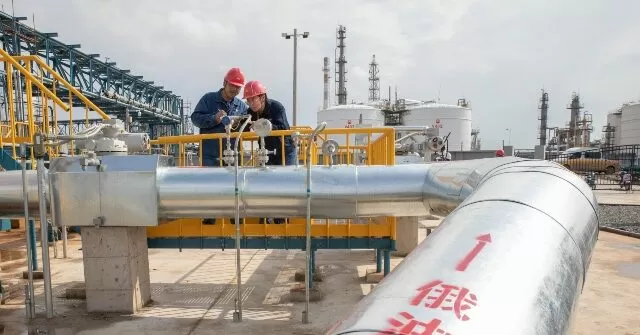Chinese leaders are facing a tough decision as they consider the future of the Power of Siberia 2 gas pipeline. This ambitious project, which would bring large amounts of Russian natural gas to China, has been stalled for some time. However, recent events have brought this issue to the forefront once again. The escalating conflict between the United States and Iran has made Beijing nervous about relying too heavily on the Middle East for energy. As a result, Chinese leaders are now reconsidering the Power of Siberia 2 gas pipeline and its potential impact on the country’s critical fossil fuel supplies.
The Power of Siberia 2 gas pipeline is a joint venture between China and Russia, with the aim of delivering 38 billion cubic meters of natural gas annually from Russia to China. This project is part of China’s larger strategy to diversify its energy sources and reduce its dependence on coal. The first phase of the pipeline, which began operations in December 2019, has already been delivering natural gas to China. However, the second phase, which would connect the pipeline to China’s western regions, has been put on hold due to disagreements over pricing and demand.
But now, with tensions rising in the Middle East, Chinese leaders are realizing the potential risks of relying too heavily on the region for energy. The recent conflict between the US and Iran has caused disruptions in the global oil market, leading to a spike in oil prices. This has raised concerns for China, as the world’s largest oil importer, about the stability of its energy supply. With the US and Iran at odds, any further escalation could have a significant impact on China’s access to critical fossil fuels.
Furthermore, China’s dependence on the Middle East for energy has been a cause for concern for some time. The region is known for its political instability and conflicts, which could potentially disrupt the flow of energy to China. This has prompted Chinese leaders to seek alternative sources of energy, such as the Power of Siberia 2 gas pipeline.
The potential benefits of the Power of Siberia 2 gas pipeline are significant for both China and Russia. For China, it would provide a stable and reliable source of natural gas, reducing its dependence on the Middle East. This would also help China in its efforts to reduce carbon emissions and shift towards cleaner energy sources. For Russia, the pipeline would provide a much-needed boost to its economy, which has been struggling under Western sanctions.
However, the current situation in the Middle East has raised doubts about the feasibility of the project. Chinese leaders are now faced with the dilemma of whether to move forward with the Power of Siberia 2 gas pipeline or to explore other options. Some experts believe that China may seek to renegotiate the terms of the project with Russia, in light of the changing circumstances. Others suggest that China may look towards other countries, such as Australia and Canada, for alternative sources of natural gas.
In any case, the Power of Siberia 2 gas pipeline remains a crucial project for China’s energy security. As the country’s demand for energy continues to grow, diversifying its sources of energy is essential for its long-term stability and development. The recent events in the Middle East have only highlighted the importance of this project and the need for China to reduce its reliance on the region.
In conclusion, the Iran conflict has brought to light the potential risks of relying too heavily on the Middle East for energy. Chinese leaders are now reconsidering the Power of Siberia 2 gas pipeline and its role in the country’s critical fossil fuel supplies. While the project may face challenges and uncertainties, it remains a crucial step towards diversifying China’s energy sources and ensuring its long-term energy security. As the world’s largest energy consumer, China must take proactive measures to safeguard its energy supply and reduce its dependence on any one region. The Power of Siberia 2 gas pipeline is a significant step in this direction, and its successful completion would greatly benefit both China and Russia.





![Complete BritRail Pass Guide [Types, How to Use It, Pros + Cons]](https://inside-news.uk/wp-content/uploads/2025/06/00221EB4-BCA2-4DBB-6CD4-83DBC37D71FA-120x86.webp)












